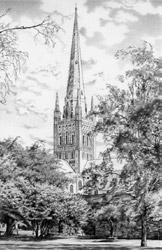The Gospel Book of Saint Augustine and the Parker Library
Compiled by Valerie Offord
The most precious book in the Parker Library at Corpus Christi College, and perhaps the most important and evocative illuminated manuscript in Cambridge, is the so-called Gospel Book of Saint Augustine, of the late sixth century. It is generally assumed to have been brought from Italy in the mission of Augustine of Canterbury (d. 604) who arrived in England in 597. It is the manuscript on which, by tradition, each new archbishop of Canterbury takes his oath of office. It was therefore used at the enthronement of Dr Rowan Williams in Canterbury Cathedral on Thursday 27 February 2003.
The collection of books in which this ‘jewel’ is found was built up by Matthew Parker, the Archbishop of Canterbury from 1559 to 1575 who holds a central place in the political and ecclesiastical history of England. Indeed, he is considered by many to be the consolidator of the English Reformation.
Matthew Parker was born in Norwich in 1504 and studied at Corpus Christi College Cambridge. He was ordained in 1527, appointed chaplain to Henry VIII in 1538 and was elected Master of Corpus Christi in 1544. The original letter of recommendation in the King’s own handwriting still lies in the college library. Parker became Vice Chancellor of the University in 1545 and again in 1549, but under Queen Mary he retired from public life to Norfolk and was deprived of his livings, retreating for some time to Frankfurt in Germany – a Marian exile no less.
Whilst chaplain to Henry, Parker taught and counselled the young Elizabeth, and when she ascended the throne he was called back and consecrated as Archbishop of Canterbury in Lambeth Palace Chapel in 1559. There were many difficulties to be faced in the new reformed Church of England and he had the unenviable task of having to find a middle way. Between 1563 and 1568 he initiated the new official version of the Bible – the Bishop’s Bible, played a part in the revision of the Prayer Book and supervised the revision of Cranmer’s 42 doctrinal articles to produce the definitive 39 Articles of Religion.
One of the great objectives of Parker’s life was to find evidence of the origins of a Christian Church in England independent of that in Rome. To this end he collected a great many ancient manuscripts, including the Anglo- Saxon chronicles, which remain in the library he founded in the college to this day. In the chaos following the dissolution of the monasteries the great collections of the religious houses had been broken up and scattered. He undertook to recover manuscripts and books many thought to be lost. He obtained a warrant from the Privy Council enabling him to ‘make a general search after all such records and muniments as related to these Realms, and which upon the dissolution of the monasteries had fallen into private hands; whereby he preserved from perishing some of the most valuable remains of our Church and Nation’.
Parker died in 1575 and was a great benefactor to the university and town of Cambridge but his legacy to Corpus Christi of the Parker Library, which contained all his books and manuscript sources and incorporates one of the finest collections of Anglo-Saxon manuscripts in the world, was outstanding. This is, indeed, England’s earliest major antiquarian collection. However, due to this and to the proviso from Parker which stipulated that if more than 12 books were lost in a year through negligence the collection should be moved to another college, access, even to scholars, has been strictly limited. A recent attempt, with a £20 million appeal, to open the library to the public has now collapsed in acrimony. Nonetheless, in an unprecedented gesture the Parker Library was open to members of the University and the city of Cambridge for the first time at the end of February 2003 when not only the Gospel Book of St Augustine was on view but also other illuminated manuscripts which belonged to or were associated with mediaeval Archbishops of Canterbury including Saint Thomas Becket.
Sources
Alderson, Andrew ‘Mediaeval Treasures are lost to the public’ Daily
Telegraph 16 February 2003.
Website: http://www.corpus.cam.ac.uk
Press Gleanings
Norwich packed with churches but for whom?
Compiled by Judith Munzinger
from an article in The Times by Ruth Gledhill (Religion Correspondent) entitled Unholy mystery of Norwich, the atheist capital of Britain

Tyndalians who attended the “Pith and Marrow” day meeting in Norwich on 29 March 2003 may not have realized that they were in “the Atheist Capital of Britain”.
In a recent article, the Times reported that Norwich is the least religious place in Britain, despite it being said of the town that it contains a church for every week of the year. Nearly one in three people in the city ticked the “no religion” box on the recent census form, giving Norwich the highest proportion of nonbelievers in the country and almost twice the national average.
The Bishop, the Right Reverend Graham James, was nevertheless puzzled by the statistics since Norwich has higher-than-average church attendance, and the National Secular Society was “astonished” since it has only a mere 15 members in the area. The secretary of the Norfolk Churches Trust, Malcolm Fisher, said that he disputed the figures. Religion was a very personal matter which some people did not wish to disclose. He himself had been offended by the religious question in the census. He felt that “perhaps the Christians in Norwich wish to keep their religion covert”.
A different explanation, offered by the local MP, was that Norwich City football club and its chairman, Delia Smith, have taken over as the new religion!